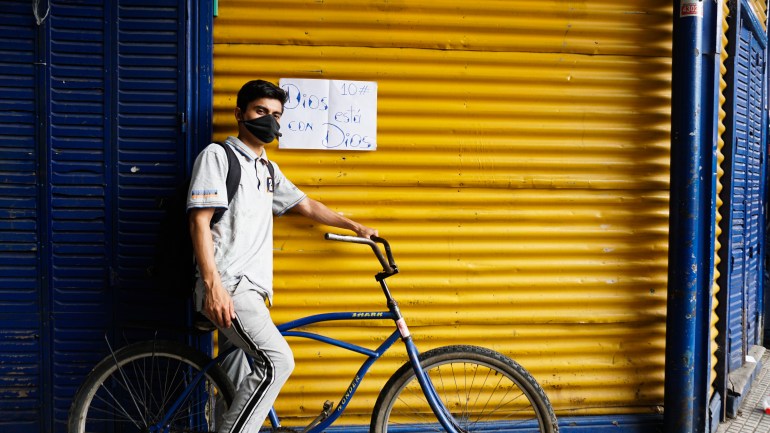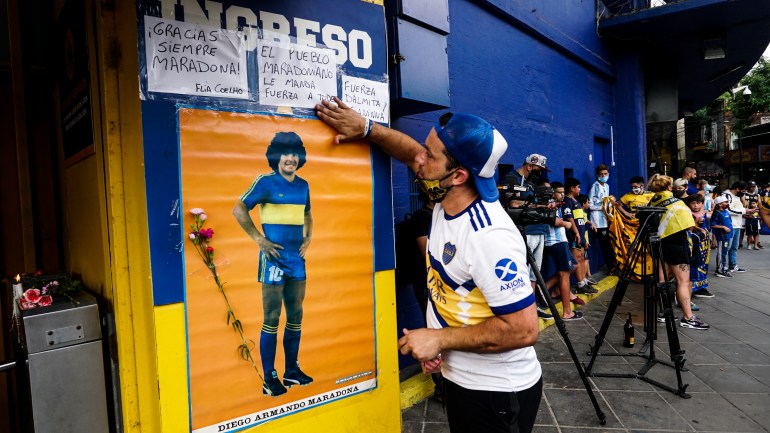Buenos Aires, Argentina — Amid boisterous chants to send off a football legend who had departed too soon, Wilson Cisnero leaned against a brightly painted brick building that had a simple, small sign he had pasted on it. “God is with God,” he wrote, punctuated with the number 10.
The 25-year-old had cycled two kilometres (1.2 miles) to the famed Buenos Aires neighbourhood of La Boca because, like many others, he did not know where else to go to when he heard that Diego Maradona had passed away.
Crowds gathered outside La Bombonera, the home of Boca Juniors, one of Argentina’s most celebrated football clubs, that counted Maradona as its star once.
“Argentina is Maradona,” said Cisnero, his devastation clear through his glassy gaze. “You look at all this disgrace with coronavirus and now this other disgrace,” he lamented. “Now soccer is left without its God.”
 Wilson Cisnero stands in front of a sign that says ‘God is with God’ in memory of Diego Maradona in Argentina [Natalie Alcoba/Al Jazeera]
Wilson Cisnero stands in front of a sign that says ‘God is with God’ in memory of Diego Maradona in Argentina [Natalie Alcoba/Al Jazeera]Maradona suffered a cardiac arrest at his home, north of the capital of Buenos Aires, on Wednesday. He had recently undergone brain surgery, pushing concerns over his health into the news. He was 60 years old.
“It’s something you can’t describe,” said Rafael Bellido, 49, sitting on the steps of La Bombonera, next to his partner Marcela Reynoso, as they shared mate, a traditional Argentine infusion. “El Diego was the person who represented us the best,” he said. “When he was playing, and you were watching, and you wanted to curse, he would curse. He reflected us. In addition to all the things that he did on the pitch.”
“Now is the time when Argentine society needs to give back all the joy that he gave to us,” he added. “And how long he made us happy. A long time. Every time he touched the pitch. You can’t describe it.”
 Marcela Reynoso and Rafael Bellido mourn Diego Maradona in Argentina [Natalie Alcoba/Al Jazeera]
Marcela Reynoso and Rafael Bellido mourn Diego Maradona in Argentina [Natalie Alcoba/Al Jazeera]In a statement, Fernandez said it was Argentinians’ good fortune to have been able to live through the era of Maradona, to have seen his greatness and enjoyed his affection.
“I doubt that we will ever see another player like Maradona in every way, not only because of his technical qualities, but also because of that courage, that strength, that grit, which he showed every time he put on the jersey he had to defend. An exceptional player who only gave us joy,” he said.
“Maradona was a genuine man, he defended what he believed in,” the president added. “He is a good example of what ordinary Argentines are, so visceral. Above all that, I always stressed that he was never a fraud – he said what he didn’t like.”
By mid-afternoon, hundreds of people had gathered at the foot of the Buenos Aires obelisk, singing Maradona’s praises as a giant banner displaying his face rippled in the wind. Outside La Bombonera, the crowds burst into intermittent song and dance.
“Diego isn’t dead, Diego isn’t dead, Diego lives in the village,” the crowd would chant. Everyone had their own story, their own reason for being there and what he meant to them. His incredible highs and the lows that he also lived through, were theirs, too.
“There will always be critics,” said Reynoso. “The important thing is that he found his own happiness.”
 Diego Covelo marks a sign in memory of Diego Maradona in Argentina [Natalie Alcoba/Al Jazeera]
Diego Covelo marks a sign in memory of Diego Maradona in Argentina [Natalie Alcoba/Al Jazeera]“If we were there during the good times, of course we’ve got to be there during the bad times,” said Covelo, 35.
Josue Mustafa, 24, saw children playing football on his way to La Boca and thought to himself: “”That is Maradona’s legacy.
That’s going to stay with everyone – in the young ones, and in people who are older.”
Blanca Salursi, standing under a giant mural of El Diego in La Boca, remembered seeing him play as a youngster in one of Buenos Aires’ shanty towns
“I also came from the slums, you come up from the bottom,” said the 60-year-old. And with a twinkle in her teary eyes as she turned to leave, she said: “Don’t ever forget that he was the best there was.”
https://news.google.com/__i/rss/rd/articles/CBMiOWh0dHBzOi8vd3d3LmFsamF6ZWVyYS5jb20vbmV3cy8yMDIwLzExLzI2L21hcmFkb25hLXBob3Rvc9IBPWh0dHBzOi8vd3d3LmFsamF6ZWVyYS5jb20vYW1wL25ld3MvMjAyMC8xMS8yNi9tYXJhZG9uYS1waG90b3M?oc=5
2020-11-26 01:29:54Z
52781207261472
Tidak ada komentar:
Posting Komentar